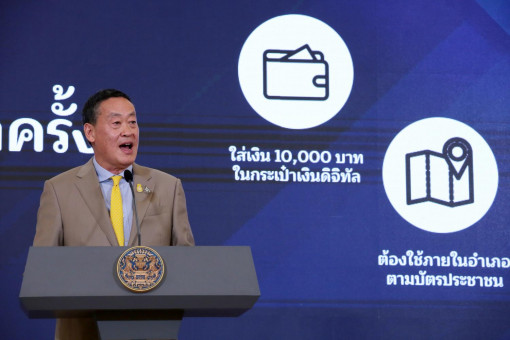PM insists handout will boost economy

The government will seek 500 billion baht in loans to finance its 10,000-baht digital money handout scheme, Prime Minister Srettha Thavisin said on Friday.
The digital currency will be offered to Thais aged 16 and older who earn less than 70,000 baht per month and have under 500,000 baht in bank deposits, he said.
Based on these criteria, an estimated 50 million people will be eligible — down from the 56 million intended originally.
People who earn more than 70,000 baht a month but have less than 500,000 baht in bank deposits will not be eligible. The same applies to those who earn less than 70,000 baht a month yet have over 500,000 baht in their accounts.
Mr Srettha made the remarks at a press conference during which he outlined details of the scheme after chairing a meeting of the digital wallet policy committee.
He said the economy is in need of a major stimulus as Thailand’s GDP has grown by only 1.9% a year on average over the past decade, with household debt jumping from 76% in 2012 to 91.6% this year.
The output from the manufacturing sector has also declined, which means fewer workers are required, resulting in many people being laid off.
“As a result, they earn less and buy less, which in turn causes factories to cut production. And this cycle repeats, causing a recession. Things will get worse unless the economy gets a boost,” Mr Srettha said.
He said the government will inject 600 billion baht into the economy — 500 billion via the digital wallet scheme as well as a 100-billion-baht fund to enhance the country’s economic potential.

The digital wallet policy is intended to inject cash flow into the economic system to boost spending during the six-month period after its launch.
The handout will begin next May, three months later than planned.
“The project will spur investment, encourage trade and the sale and purchase of goods, and orders for goods will be placed with SMEs and large factories,” the prime minister said.
The money can only be used to buy food and consumer goods. It cannot be used to purchase goods online, cigarettes or liquor; cash vouchers and such valuables as diamonds, gems or gold; and it cannot be used to pay off debts or cover water or electricity bills, fuel, natural gas or tuition fees.
Participating shops do not have to be in the tax system or register for VAT, the prime minister said.
The new 100-billion-baht fund, meanwhile, will be used to enhance the country’s competitiveness in various fields, said Mr Srettha. This could include investing in new technologies and the development of human resources. It is intended to draw highly competent people in various fields to contribute to economic growth.
“I would like to emphasise that this (digital money handout scheme) is not a form of welfare to help the needy. Rather, it is about injecting money into the economy through spending to enable people to be partners with the government in reviving the economy,” the prime minister said.
As for the source of funding for the programme, Mr Srettha said the most practical approach would be for the government to propose a bill seeking a special loan of 500 billion baht.
The draft bill will be sent to the Council of State this year to ensure it does not contravene any laws. It will be forwarded to parliament early next year, he said.
Mr Srettha said the bill would be passed by parliament in line with Section 53 of the State Fiscal and Financial Discipline Act of 2018 so the programme can start in May.
The other 100 billion baht for economic projects will come from state budgets, he said.
Sirikanya Tansakun, a deputy leader of the opposition Move Forward Party, said the government has no other options.
There is a risk someone may ask the Constitutional Court to rule against the bill on the grounds that there is no justification for an urgent handout, she said.

